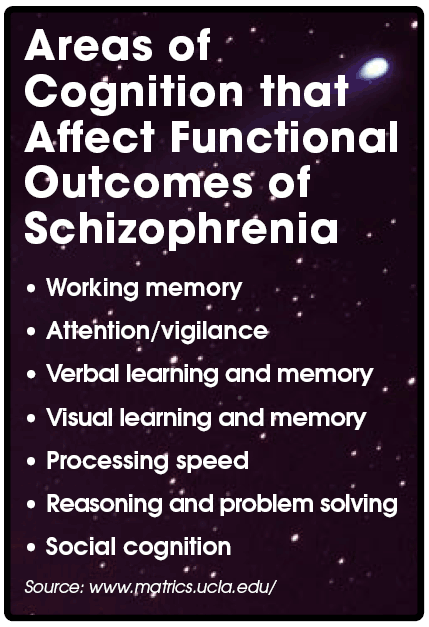Print Friendly
Cognition: The New Frontier in Treating Schizophrenia
William Carpenter, MD
Dr Carpenter is Professor of Psychiatry and Pharmacology, University of Maryland School of Medicine, Director, Maryland Psychiatric Research Center
Dr. William Carpenter has decades of experience studying and treating schizophrenia, and is one of the most prominent experts in his field. It is his opinion—and it is one increasingly backed by scientific data—that the most important factor in the functional outcome of schizophrenia is pervasive cognitive deficit in those suffering from the disorder. Further, clinicians have too often ignored cognitive deficit in favor of focusing solely on psychoses, affect, and resolving symptoms.
As the subject of the relatively new NIMH task force on schizophrenia, MATRICs, cognitive deficit is finally getting the attention it deserves. Unfortunately, Dr. Carpenter says, “we still have no real effective treatment for cognitive deficits in schizophrenics.” Cognitive deficits affect nearly all patients with schizophrenia, and are easily separated from other symptom complexes and closely tied to functional outcomes. Dr. Carpenter refers to it as the “Holy Grail of schizophrenia treatment.”
Background
Schizophrenia had long been considered a unitary disorder, but in the early 1970s data suggested that different symptom complexes were independent. As Dr. Carpenter explains, “symptoms affecting drive and volition and emotion were separate from the psychotic systems. The psychotic systems had dominated evaluation but actually had little to do with social, occupational, and functional outcomes.” During the 70s, 80s, and 90s, the emphasis in schizophrenia was on three different symptom domains: disorganization of thought and behavior, reality distortion, and restricted affect. Lately, more and more attention has shifted to cognitive problems. This shift has been driven by research showing both that measures of cognition aren’t correlated to other symptom domains and that, as shown in a review by Dr. Michael Green, psychoses are not correlated to functional outcomes in schizophrenia but cognitive deficits are.
An important distinction, Dr. Carpenter points out, “is between “cognitive” ratings on common metrics like the PANSS rating scale—which measure the symptomatic expression of disorganized thought and behavior—and actual cognitive faculty, which comprises factors like attention and short-term memory, and which is measured by neuropsychological tests.”
Treatment
Schizophrenics seem to have lost, on average, 5 to 10 IQ points. Further, cognitive deficit has most likely been present from a very young age. “These deficits,” Dr. Carpenter says, “may have been present from birth, and likely predate the advent of psychoses and full-blown schizophrenia; they affect the whole developmental trajectory. Because of this, there could be a very positive value to treatment that enhanced cognition performance, but we don’t know yet exactly what impact regaining cognitive capacity would have on a patient’s life.” All this makes development and testing of cognition-enhancing drugs rather difficult. The FDA’s stance is, roughly, that they won’t approve a drug merely because it enhances performance on a cognitive test; the drug must make a positive difference in the patient’s life. All the likely molecular targets for cognition-enhancing drugs have been suggested by animal research—Dr. Carpenter cites the D1 agonist which might help with prefrontal processing—and this leads to a frustrating catch 22: “We don’t have any validated predictive models,” Dr. Carpenter says. ‘If you have a compound that helps a rat learn something faster, you don’t know if that will have a beneficial affect on humans. In reviewing compounds for testing in schizophrenia, it’s a lot easier to lay out molecular targets that are of interest, but we can’t select drugs that already have evidence from animal work that’s predictive: there’s no established validation, and there’s little human data.” As Dr. Carpenter further points out, “It seems likely that somehow conserving IQ points in a five or six year-old child would make a functional difference in his or her long-term outcome, but it’s much harder to predict what, if any, functional benefit would accompany giving those IQ points back to a 35 year-old adult with schizophrenia.”
What’s Next?
There is, however, hope. The aforementioned NIMH MATRICs program is a formal process of trying to get industry, FDA, and academic scientists together to try and focus on a workable approach to developing compounds for cognition in schizophrenia. Dr. Carpenter says it has been very successful in drawing attention to cognition, and that there is now even a kind of consensus agreement on what kind of clinical trial could win an indication from the FDA: http://schizophreniabulletin.oxfordjournals.org/cgi/content/abstract/31/1/5. Now, TURNS is charged with the responsibility of reviewing and selecting compounds for cognition and conducting initial tests with them.
“The biggest problem,” Dr. Carpenter says, “in reviewing a large number of compounds is that it is easy to find interesting molecular targets for drug action, but hard to find any evidence of a beneficial effect on human cognition.”
With increasing evidence that just treating symptoms and psychoses will never fully resolve schizophrenia, the cognitive aspect of the disorder is now entering the spotlight. Continued work is necessary to find and develop treatments that has a positive effect on cognition. For more information go to: Turns http://www.turns.ucla.edu/turns-overview-frame.htm

Source: http://www.matrics.ucla.edu/